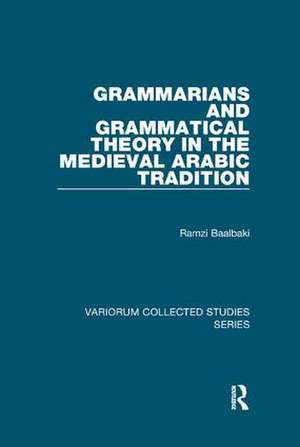Grammarians and Grammatical Theory in the Medieval Arabic Tradition: Variorum Collected Studies
Autor Ramzi Baalbakien Limba Engleză Paperback – 10 iun 2019
Din seria Variorum Collected Studies
- 9%
 Preț: 938.85 lei
Preț: 938.85 lei -
 Preț: 311.41 lei
Preț: 311.41 lei -
 Preț: 351.48 lei
Preț: 351.48 lei -
 Preț: 313.38 lei
Preț: 313.38 lei -
 Preț: 386.77 lei
Preț: 386.77 lei -
 Preț: 325.68 lei
Preț: 325.68 lei -
 Preț: 396.00 lei
Preț: 396.00 lei -
 Preț: 312.75 lei
Preț: 312.75 lei - 9%
 Preț: 1041.23 lei
Preț: 1041.23 lei -
 Preț: 258.66 lei
Preț: 258.66 lei -
 Preț: 299.55 lei
Preț: 299.55 lei - 9%
 Preț: 938.08 lei
Preț: 938.08 lei -
 Preț: 343.33 lei
Preț: 343.33 lei -
 Preț: 311.18 lei
Preț: 311.18 lei - 9%
 Preț: 937.13 lei
Preț: 937.13 lei -
 Preț: 351.41 lei
Preț: 351.41 lei -
 Preț: 320.00 lei
Preț: 320.00 lei - 34%
 Preț: 764.20 lei
Preț: 764.20 lei - 23%
 Preț: 315.48 lei
Preț: 315.48 lei - 36%
 Preț: 740.06 lei
Preț: 740.06 lei - 34%
 Preț: 764.20 lei
Preț: 764.20 lei - 34%
 Preț: 680.73 lei
Preț: 680.73 lei - 26%
 Preț: 247.40 lei
Preț: 247.40 lei - 34%
 Preț: 485.78 lei
Preț: 485.78 lei - 38%
 Preț: 766.91 lei
Preț: 766.91 lei - 34%
 Preț: 767.07 lei
Preț: 767.07 lei - 34%
 Preț: 764.20 lei
Preț: 764.20 lei - 34%
 Preț: 769.51 lei
Preț: 769.51 lei - 38%
 Preț: 769.85 lei
Preț: 769.85 lei - 34%
 Preț: 826.68 lei
Preț: 826.68 lei - 25%
 Preț: 225.28 lei
Preț: 225.28 lei - 25%
 Preț: 225.54 lei
Preț: 225.54 lei - 34%
 Preț: 736.38 lei
Preț: 736.38 lei - 34%
 Preț: 738.43 lei
Preț: 738.43 lei - 25%
 Preț: 226.52 lei
Preț: 226.52 lei - 33%
 Preț: 491.66 lei
Preț: 491.66 lei - 34%
 Preț: 485.78 lei
Preț: 485.78 lei - 34%
 Preț: 485.78 lei
Preț: 485.78 lei - 36%
 Preț: 739.17 lei
Preț: 739.17 lei - 38%
 Preț: 766.34 lei
Preț: 766.34 lei - 31%
 Preț: 473.94 lei
Preț: 473.94 lei - 18%
 Preț: 843.61 lei
Preț: 843.61 lei - 38%
 Preț: 774.91 lei
Preț: 774.91 lei - 38%
 Preț: 769.92 lei
Preț: 769.92 lei - 34%
 Preț: 764.20 lei
Preț: 764.20 lei - 51%
 Preț: 485.78 lei
Preț: 485.78 lei - 36%
 Preț: 488.49 lei
Preț: 488.49 lei - 34%
 Preț: 769.10 lei
Preț: 769.10 lei - 38%
 Preț: 766.99 lei
Preț: 766.99 lei - 18%
 Preț: 1019.01 lei
Preț: 1019.01 lei
Preț: 303.81 lei
Preț vechi: 351.31 lei
-14% Nou
Puncte Express: 456
Preț estimativ în valută:
58.13€ • 60.86$ • 48.10£
58.13€ • 60.86$ • 48.10£
Carte tipărită la comandă
Livrare economică 05-19 aprilie
Preluare comenzi: 021 569.72.76
Specificații
ISBN-13: 9781138382480
ISBN-10: 1138382485
Pagini: 356
Dimensiuni: 150 x 224 mm
Greutate: 0.66 kg
Ediția:1
Editura: Taylor & Francis
Colecția Routledge
Seria Variorum Collected Studies
Locul publicării:Oxford, United Kingdom
ISBN-10: 1138382485
Pagini: 356
Dimensiuni: 150 x 224 mm
Greutate: 0.66 kg
Ediția:1
Editura: Taylor & Francis
Colecția Routledge
Seria Variorum Collected Studies
Locul publicării:Oxford, United Kingdom
Cuprins
Contents: Preface; Sibawayhi’s Kitab: The book in the grammatical tradition: development in content and methods; Some aspects of harmony and hierarchy in Sibawayhi’s grammatical analysis; A possible early reference to Sibawayhi’s Kitab?; A contribution to the study of technical terms in early Arabic grammar: the term asl in Sibawayhi’s Kitab; Coalescence as a grammatical tool in Sibawayhi’s Kitab. Grammarians and Related Disciplines: The treatment of qira’at by the 2nd and 3rd century grammarians; The relation between nahw and balaga: a comparative study of the methods of Sibawayhi and Gurgani; A balagi approach to some grammatical shawahid; Early Arab lexicographers and the use of Semitic languages; Kitab al-’ayn and Jamharat al-luga. Grammatical Theory: Arab grammatical controversies and the extant sources of the 2nd and 3rd centuries A.H.; Tawahhum: an ambiguous concept in early Arabic grammar; 'I’rab and bina’ from linguistic reality to grammatical theory; Reclassification in Arabic grammatical theory; Expanding the ma’nawi ’awamil: Suhayli’s innovative approach to the theory of regimen; The occurrence of 'insa’ instead of habar: the gradual formulation of a grammatical issue; Bab al-fa’ [fa’ + subjunctive] in Arabic grammatical sources; Teaching Arabic at university level: problems of grammatical tradition; Index.
Notă biografică
Ramzi Baalbaki is Professor of Arabic at the American University of Beirut, the Lebanon
Recenzii
'Given that the papers, selected for the Variorum, span nearly a quarter of a century from 1979 to 2001, their great coherence, both methodological and thematic, is striking, so too is their impressively high scholarly standard.... this Variorum volume represents a milestone in the study of both the history of Arabic grammar and one of the three branches of rhetoric, the science of the meanings. ...The author may justly be called one of the leading scholars in this field over the last quarter of a century, who excels by the precision of his methods and the value of his conclusions.' Journal of Islamic Studies
Descriere
Professor Baalbaki deals here with the Arabic grammatical tradition and the analytical methods of the medieval Arab grammarians. The essays included open new perspectives on the most authoritative work on Arabic grammar, Sibawayhi's tome or Kitab, on the relation between grammatical study and other areas of linguistic enquiry such as Qur'anic readings and stylistics, and on the techniques which the grammarians employed to explain and rationalize usage and to incorporate within their system the vast body of dialectal material which the corpus comprises. The author has sought to highlight the central position which Arabic grammar enjoys within the wider Arab culture, and in so doing has examined several aspects of a legacy which has been revered over a millennium and which forms to this very day the backbone of the teaching of grammar in the Arab world.
